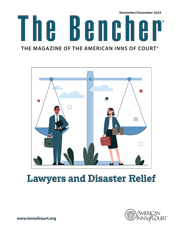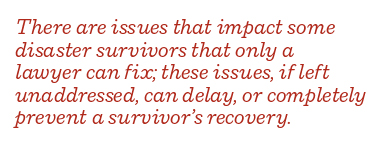Lawyers Are Critical to Successful Recovery by Disaster Survivors
The Bencher—November/December 2024
By Christa Flowers Figgins, Esquire
 Born and raised in Florida, I am no stranger to severe weather. In my four decades in Florida, I bought bread and milk, boarded up my windows, and filled every bathtub in my house full of water before at least a dozen hurricanes; I evacuated in the face of even more. When my husband accepted a position in Oklahoma in 2012 and we started packing to move to Oklahoma City that fall, many of my friends had only one question: “Aren’t you afraid of the tornadoes?” I scoffed at the very thought. “After all of those hurricanes I’ve been through…of course not!” I said. “I doubt I’ll even see a tornado!” Well, I have been wrong before, but I was never more wrong than I was at that moment. Spring was coming, and the spring of 2013 in Oklahoma came with a vengeance.
Born and raised in Florida, I am no stranger to severe weather. In my four decades in Florida, I bought bread and milk, boarded up my windows, and filled every bathtub in my house full of water before at least a dozen hurricanes; I evacuated in the face of even more. When my husband accepted a position in Oklahoma in 2012 and we started packing to move to Oklahoma City that fall, many of my friends had only one question: “Aren’t you afraid of the tornadoes?” I scoffed at the very thought. “After all of those hurricanes I’ve been through…of course not!” I said. “I doubt I’ll even see a tornado!” Well, I have been wrong before, but I was never more wrong than I was at that moment. Spring was coming, and the spring of 2013 in Oklahoma came with a vengeance.
Beginning May 18, 2013, Oklahoma saw waves of unprecedented severe weather. On May 20, 2013, a long-track EF-5 tornado devastated the city of Moore, Oklahoma. Only days later, the city of El Reno experienced one of the largest and strongest tornadoes ever recorded on Earth. On the ground for miles, the devastation left behind these storms, both in human and material terms, was almost indescribable. Dozens of people lost their lives, including seven children in their elementary school. Where homes once stood, many had been wiped to the slab; in other areas only piles of rubble and twisted vestiges of trees remained. A federal disaster was quickly declared, and the Federal Emergency Management Agency (FEMA) and dozens of nonprofit disaster response agencies began to set up response efforts.
As a staff member at Legal Aid Services of Oklahoma (LASO), the statewide nonprofit Legal Services Corporation (LSC)-funded civil legal aid for low-income persons in Oklahoma, outreach was part of my responsibilities. Following the disaster declaration in 2013, LASO had staff attorneys present at as many disaster survivor outreach events as possible, especially at the one-stop resource centers for survivors such as the FEMA Disaster Recovery Centers and the Oklahoma Voluntary Organizations Active in Disaster (OKVOAD) Multi-Agency Resource Center. While LASO staff persons were welcomed in those places, I could tell that no one, survivors included, understood why LASO was there as a resource at all. “Who needs a lawyer after a tornado?” and “People need food, shelter, and clothing after a disaster, not lawyers” were sentiments I heard more than once.
 I get that no one ever thinks “We’ve had a disaster! We need to call the lawyers!” People think disaster response and they think about first responders, FEMA, the American Red Cross, the Salvation Army, Catholic Charities, and many more agencies that typically swing into action the moment a disaster occurs—and they should think of all those agencies. However, it is particularly important that they also think about the lawyers. Why? Because lawyers are critical to disaster recovery. There are issues that impact some disaster survivors that only a lawyer can fix; these issues, if left unaddressed, can delay, or completely prevent a survivor’s recovery.
I get that no one ever thinks “We’ve had a disaster! We need to call the lawyers!” People think disaster response and they think about first responders, FEMA, the American Red Cross, the Salvation Army, Catholic Charities, and many more agencies that typically swing into action the moment a disaster occurs—and they should think of all those agencies. However, it is particularly important that they also think about the lawyers. Why? Because lawyers are critical to disaster recovery. There are issues that impact some disaster survivors that only a lawyer can fix; these issues, if left unaddressed, can delay, or completely prevent a survivor’s recovery.
Why would a disaster survivor need an attorney? One major issue is generational home ownership. Many people live in a home that they do not legally own because no one did the probate when their grandparent(s) or parent(s) passed away. Many response/relief/recovery agencies have funding available following disasters to help survivors with home repairs or rebuilding costs not covered by insurance. However, those agencies will not provide recovery funding to help rebuild a disaster-impacted home if the applicant cannot show they are the home’s legal owner. Lawyers are needed to help those survivors clean up their ownership issues. Other typical post-disaster issues for which a survivor may need an attorney are landlord/tenant problems. There are high numbers of evictions following disaster events and instances of landlords not making repairs. Tenants often need help understanding their rights. Domestic violence issues spike after disaster events, along with family law issues involving custody and visitation. Injured persons and orphaned children may need guardianships. Insurance issues can occur when companies and homeowners do not agree on repair or replacement costs. Contractor fraud issues also occur in large numbers after disasters, as unlicensed “contractors” perform shoddy work, or take survivors’ insurance checks and do no work at all. Finally, in declared disasters, survivors may need assistance with FEMA appeals or FEMA recoupment cases. These are just a few examples where an attorney being involved could make all the difference in a survivor’s recovery.
Since 2013, Oklahoma has been impacted by dozens of disaster events and LASO staff have responded, serving thousands of disaster survivors and their family members. Key lessons we have learned as an organization include the power of partnerships, the critical nature of developing relationships with other agencies that provide disaster response services, and why it is important to familiarize the disaster response community with how lawyers can help and why they are needed. If you want to have access to survivors so you can help them, your organization needs to be a trusted partner in the disaster response community in your area.
How do you become a trusted partner? Attend meetings of your state Voluntary Organizations Active in Disaster (VOAD) and join as a member or partner. Led by National VOAD, the VOAD movement fosters cooperation, communication, coordination, and collaboration amongst disaster response organizations to promote the most effective delivery of resources possible to survivors. You can find more information about National VOAD and locate contact information for your state VOAD chapter (every state has one!) at www.NVOAD.org. Once your organization is a VOAD member or partner, when your state VOAD holds a one-stop Multi-Agency Resource Center for survivors following an event, your organization can attend.
Members of your organization can volunteer to assist a local legal aid agency that is already a trusted partner and VOAD member organization.
If your state bar association has a disaster committee that is already plugged in and involved in disaster response efforts in their area, get involved.
Once those agencies and entities know who you are, they need to know why survivors might need legal help and how you can provide that assistance. To accomplish that goal, LASO staff provided training statewide and online to partner agencies explaining what LASO could do for survivors and trained response agency case managers to spot legal issues impacting survivors that should be referred to LASO following a disaster event. By doing so, LASO has had a successful training and referral system set up with all the major disaster survivor case management agencies in Oklahoma for a decade.
If you and/or your organization want to help survivors in the future, there are steps you can take now to help lay the groundwork for success. First, seek out training on the cycle of disaster, how disaster response works in your state, and the common legal issues that arise following a disaster event. Many free resources exist and can be accessed online such as www.LADRC.org, a great website created by LSC, and www.NVOAD.org, the previously mentioned website of the National Voluntary Organizations Active in Disaster. Second, talk to your local legal aid about disaster work their staff may be doing and ask how you can help to gain experience; many legal aid programs also have tool kits and trainings available for potential pro bono attorneys available on their websites and YouTube channels. You can locate your state’s LSC-funded legal aid at www.lsc.gov. Some state legal aids with particularly strong disaster response programs include Alaska, Florida, Iowa, Kentucky, Louisiana, Montana, Nebraska, and Texas. I cannot say all of that without saying that I am particularly proud of the work being done in Oklahoma by the staff at LASO and at Oklahoma Indian Legal Services (OILS).
The staff at OILS have been incredible partners for a decade, collaborating with LASO on trainings, accepting referrals, and working together with LASO staff to make sure outreach sites are staffed when survivors need help. Another great resource for training is the American Bar Association Young Lawyers disaster program; more information about their work may be found at www.americanbar.org/groups/young_lawyers/about/initiatives/disaster-legal-services/. Finally, figure out how you and your organization can plug into recovery efforts in your state following a disaster event. Talk to agencies within your state VOAD, the disaster committee in your state bar if one exists, and your local legal aid—all can help you and your organization figure out what the best resource is that you can bring to the disaster response table and how to best integrate that resource into the recovery efforts in your area as a whole.
I have been a lawyer for over 25 years; I spent five of those years as a law clerk and the remaining 20 years have been spent with legal aid. In my 20 years with legal aid, the past 11 years have been spent doing disaster work. Those years have been the most rewarding and fulfilling years of my professional life. There is something very special about the disaster response community and something very powerful in helping survivors recover from disaster events. As natural and human-created disaster events increase, please consider lending your time and talent to this effort in your community.
Christa Flowers Figgins, Esquire, is the director of mission advancement and disaster legal services at Legal Aid Services of Oklahoma Inc. An attorney licensed in Florida, Figgins also serves on the National VOAD Board of Directors.